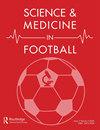Infectious diseases and football – lessons not only from COVID-19
IF 3.5
2区 医学
Q1 SPORT SCIENCES
引用次数: 27
Abstract
The past few weeks have seen us make numerous and increasing adjustments to our regular schedules as the Corona virus (COVID-19) outbreak turned from an epidemic to a pandemic. Virtually every aspect of daily life has been influenced by preventive measures, the most notable of which is social distancing, and sporting events have not been an exception. In the case of football, this ended in the postponement of the EURO 2020, one of the largest tournaments world-wide. However, this is not the first time that an outbreak occurs at an ‘inconvenient’ time for football. In 2007 and 2008 a measles outbreak was noticed in Switzerland shortly before the 2008 European Football Championship (Richard et al. 2008). A similar measles outbreak took place in 2009 in South Africa, before the start of the 2010 FIFA World Cup (Blumberg et al. 2010; Sartorius et al. 2013). In 2011, there was an endemic EHEC (enterohemorrhagic E. coli) outbreak in Germany before the start of the Women’s World Cup. The 2014 FIFA World Cup in Brazil posed the risk of vector-transmitted diseases. During the tournament, Dengue risk was close to its peak when matches were played in at least three cities: Fortaleza, Natal, and Salvador (Hay 2013). In this particular tournament, there were other mosquito-transmitted diseases, such as Zika and Yellow Fever, for which attendants and players had to take special precautions. None of these events was cancelled or postponed because preventive measures were able to either confine the outbreak or sufficiently reduce the risk of transmission. Moreover, every year sports events take place during the flu season. Although it may seem like previous experience with respiratory diseases should teach us how to cope with the current situation, there are very important differences in the case of COVID19: There is no vaccine available, the virus is very contagious and its letality is considerable. In both measles outbreaks, attendants, participants, and staff were strongly encouraged to vaccinate against measles beforehand, and such vaccination provides high safety against the disease. The same is true in the case of influenza although vaccination is a bit less effective. This, however, is clearly not a possibility at the moment and evidently necessitates different management. Given that social distancing has been identified as a key factor in the prevention of COVID-19 spread spread, matches were initially carried out without fans. However, the increasing number of COVID-19 cases forced sporting associations to postpone and even cancel competitions. The 2020 UEFA European Football Championship, UEFA Champions League, and major national leagues, to name only a few, have now been deferred and it is unclear when the pending matches will take place. Rescheduling events without clear dates foreshadows a period of financial uncertainty for football. The loss of income could soon even force clubs to shut down. However, the immediate priority for our society is to control the COVID19 pandemic. Therefore, clubs will have to abide regulations from health authorities and attempt to recover afterwards, which will probably involve tight schedules.传染病与足球——不仅从新冠肺炎中吸取教训
在过去的几周里,随着冠状病毒(新冠肺炎)疫情从流行病转变为大流行,我们对常规日程进行了大量且不断增加的调整。几乎日常生活的方方面面都受到了预防措施的影响,其中最显著的是保持社交距离,体育赛事也不例外。就足球而言,这最终导致2020年欧洲杯延期,这是世界上最大的锦标赛之一。然而,这并不是第一次在足球“不方便”的时候爆发疫情。2007年和2008年,在2008年欧洲足球锦标赛前不久,瑞士爆发了麻疹疫情(Richard等人,2008)。2009年,在2010年国际足联世界杯开赛之前,南非也爆发了类似的麻疹疫情(Blumberg等人,2010年;Sartorius等人,2013年)。2011年,在女足世界杯开赛前,德国爆发了地方性肠出血性大肠杆菌疫情。2014年巴西国际足联世界杯带来了媒介传播疾病的风险。在锦标赛期间,当比赛在至少三个城市进行时,登革热风险接近峰值:福塔莱萨、纳塔尔和萨尔瓦多(Hay,2013)。在这场比赛中,还有其他蚊子传播的疾病,如寨卡病毒和黄热病,参赛者和选手必须采取特殊预防措施。这些活动都没有被取消或推迟,因为预防措施能够限制疫情爆发或充分降低传播风险。此外,每年的体育赛事都在流感季节举行。尽管以前的呼吸道疾病经验似乎应该教会我们如何应对当前的情况,但在新冠肺炎病例中有非常重要的区别19:没有可用的疫苗,这种病毒传染性很强,传染性很强。在这两次麻疹疫情中,都强烈鼓励服务员、参与者和工作人员提前接种麻疹疫苗,这种疫苗接种可以提供高安全性。流感也是如此,尽管接种疫苗的效果稍差。然而,这在目前显然是不可能的,显然需要不同的管理。鉴于社交距离已被确定为防止新冠肺炎传播的关键因素,比赛最初在没有球迷的情况下进行。然而,新冠肺炎病例的不断增加迫使体育协会推迟甚至取消比赛。2020年欧洲足球锦标赛(UEFA European Football Championship)、欧洲冠军联赛(UEFA Champions League)和主要国家联赛(major national League),仅举几个例子,现已推迟,尚不清楚即将举行的比赛何时举行。在没有明确日期的情况下重新安排赛事预示着足球将迎来一段财政不确定性时期。收入的损失甚至可能很快迫使俱乐部倒闭。然而,我们社会的当务之急是控制新冠肺炎疫情。因此,俱乐部必须遵守卫生部门的规定,并在之后尝试康复,这可能涉及到紧张的日程安排。
本文章由计算机程序翻译,如有差异,请以英文原文为准。
求助全文
约1分钟内获得全文
求助全文

 求助内容:
求助内容: 应助结果提醒方式:
应助结果提醒方式:


